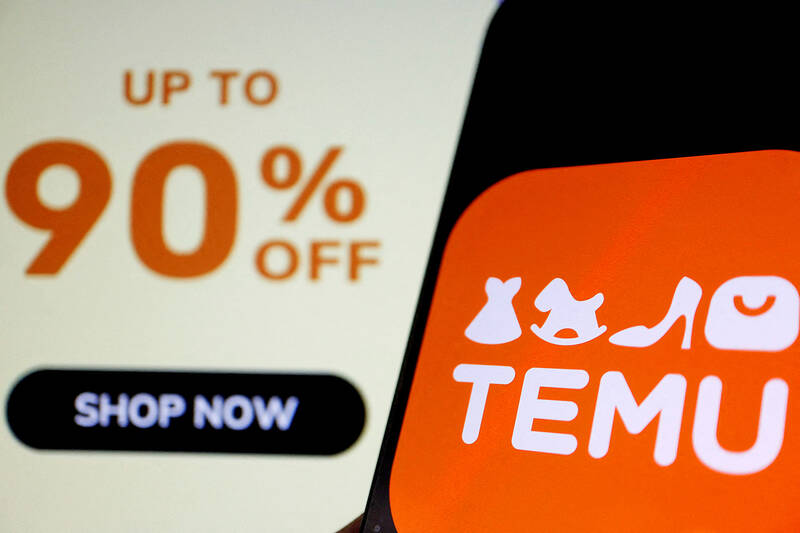Chinese e-commerce giant Pinduoduo Holdings Inc (拼多多) announced yesterday its net profit for the first quarter more than tripled, as the Temu owner continues to boost its competitiveness in its home market and abroad.
Pinduoduo is one of China’s leading online retailers — owing largely to its success in reaching consumers in rural areas with a diverse offering of low-cost products.
The company’s overseas platform, Temu, has surged since its September 2022 launch to become one of the most popular online shopping sites in the US, propelled by a marketing strategy that featured multiple prime-time Super Bowl advertisements.

Photo: Reuters
Pinduoduo said net profit for the first three months of the year was US$3.88 billion, up 246 percent from the same period of last year.
The Shanghai-based firm added that sales in the first quarter were about US$11.2 billion, an increase of 131 percent from a year earlier.
Temu expanded last year into the EU market, where its shopping app amassed an average of around 75 million monthly active users in the 27-country bloc.
But the shopping app’s rise has also encountered turbulence. In March, a promotional campaign in Britain and France backfired due to concerns over data privacy.
Last month, regulators in South Korea opened an investigation into Temu on suspicion of unfair practices including false advertising and poor product quality.
Earlier this month, European consumer rights groups accused it of using manipulative sales techniques and lacking transparency about traders on the platform.
Despite the setbacks, Pinduoduo remains the newest competitor to established e-commerce juggernauts, including Amazon.com Inc in the US and Alibaba Group Holding Ltd (阿里巴巴) in China.
At home, Pinduoduo has found growing success with low-price products as Chinese consumers curb their spending against a backdrop of economic slowdown and high youth unemployment.
In March, the company announced near-double annual profit for last year, a year in which it briefly surpassed Alibaba — owner of Chinese e-commerce behemoth Taobao (淘寶) — in terms of market capitalization for the first time. On Tuesday, it was valued at around US$202 billion, compared to Alibaba’s US$209 billion.
Pinduoduo co-founder Chen Lei (陳磊) indicated there was still space to grow. “Our global business is still in the exploration stage and there’s plenty of room for improvement,” he said.
Pinduoduo’s executive director and co-CEO Zhao Jiazhen (趙佳臻) said this year would be “critical” to “deepen the execution of our high-quality development strategy.”
“We will focus our efforts on improving the overall consumer experience, strengthening our supply chain capabilities, and fostering a healthy platform ecosystem.”

When an apartment comes up for rent in Germany’s big cities, hundreds of prospective tenants often queue down the street to view it, but the acute shortage of affordable housing is getting scant attention ahead of today’s snap general election. “Housing is one of the main problems for people, but nobody talks about it, nobody takes it seriously,” said Andreas Ibel, president of Build Europe, an association representing housing developers. Migration and the sluggish economy top the list of voters’ concerns, but analysts say housing policy fails to break through as returns on investment take time to register, making the

‘SILVER LINING’: Although the news caused TSMC to fall on the local market, an analyst said that as tariffs are not set to go into effect until April, there is still time for negotiations US President Donald Trump on Tuesday said that he would likely impose tariffs on semiconductor, automobile and pharmaceutical imports of about 25 percent, with an announcement coming as soon as April 2 in a move that would represent a dramatic widening of the US leader’s trade war. “I probably will tell you that on April 2, but it’ll be in the neighborhood of 25 percent,” Trump told reporters at his Mar-a-Lago club when asked about his plan for auto tariffs. Asked about similar levies on pharmaceutical drugs and semiconductors, the president said that “it’ll be 25 percent and higher, and it’ll

CHIP BOOM: Revenue for the semiconductor industry is set to reach US$1 trillion by 2032, opening up opportunities for the chip pacakging and testing company, it said ASE Technology Holding Co (日月光投控), the world’s largest provider of outsourced semiconductor assembly and test (OSAT) services, yesterday launched a new advanced manufacturing facility in Penang, Malaysia, aiming to meet growing demand for emerging technologies such as generative artificial intelligence (AI) applications. The US$300 million facility is a critical step in expanding ASE’s global footprint, offering an alternative for customers from the US, Europe, Japan, South Korea and China to assemble and test chips outside of Taiwan amid efforts to diversify supply chains. The plant, the company’s fifth in Malaysia, is part of a strategic expansion plan that would more than triple

Taiwanese artificial intelligence (AI) server makers are expected to make major investments in Texas in May after US President Donald Trump’s first 100 days in office and amid his rising tariff threats, Taiwan Electrical and Electronic Manufacturers’ Association (TEEMA, 台灣電子電機公會) chairman Richard Lee (李詩欽) said yesterday. The association led a delegation of seven AI server manufacturers to Washington, as well as the US states of California, Texas and New Mexico, to discuss land and tax issues, as Taiwanese firms speed up their production plans in the US with many of them seeing Texas as their top option for investment, Lee said. The